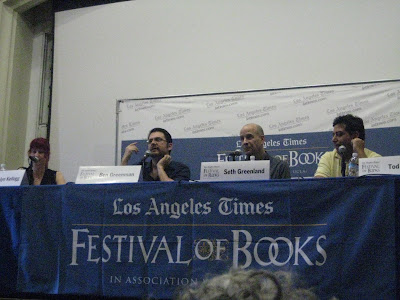 This week marked the 100th anniversary of John Fante's birth. Fante is most well-known for his novels featuring protagonist Arturo Bandini in LA's Bunker Hill neighborhood, such as the classic Ask the Dust. He is one of many writers to start to define the "new Californian" in the early 20th century.
This week marked the 100th anniversary of John Fante's birth. Fante is most well-known for his novels featuring protagonist Arturo Bandini in LA's Bunker Hill neighborhood, such as the classic Ask the Dust. He is one of many writers to start to define the "new Californian" in the early 20th century.
The old folk from Indiana and Iowa and Illinois, from Boston and Kansas City and Des Moines, they sold their homes and their stores, and they came here by train and by automobile to the land of sunshine, to die in the sun, with just enough money to live until the sun killed them, tore themselves out by the roots in their last days, deserted the smug prosperity of Kansas City and Chicago and Peoria to find a place in the sun. And when they got here they found that other and greater thieves had already taken possession, that even the sun belonged to the others…These were my countrymen, these were the new Californians (Ask the Dust, 45).
The Hammer Museum hosted an event in Fante's honor on Tuesday and fans were invited to raise a glass at the King Eddy Saloon last night. (It is with great regret that I missed both of these events due to work obligations.) The LA Times' Carolyn Kellogg spoke with John's son, Dan Fante on the occasion of his father's birthday.
His father, Fante says, "was pretty much Arturo Bandini, only more intense...There was a compulsion and a passion and a drivenness and an ambition about my father that exceeded all his other characteristics," Fante adds. "My dad had two overriding moods. One was angry and the other was angrier." Now at work on a memoir about himself and his father, Fante explains that "what began as a very difficult relationship ended as an extremely loving relationship."
When he was 8 or 10, Dan brought him stories he'd written. John Fante, who hand-penned stories in the 1930s and later wrote screenplays before dawn, sitting in his shower stall and typing with two fingers, did not intend to make writing the family vocation. The feedback he gave his young son, Dan says, was "not good."
Stephen Cooper also wrote a piece for the LA Times, providing some background on Fante for those who may be lucky enough to have yet discovered him.
With a wife and four children to support, he cranked out treatments, screenplays and television scripts. Most proved forgettable and were never produced. For his efforts, he was accused of wasting his gifts.
Perhaps those who make such an accusation should be reminded that great novels are not made to order. Here is where the wonder deepens, for how are we to understand the unlikely convergences that, in late 1938 and early 1939, enabled Fante to write what many still consider the best novel ever written about Los Angeles, "Ask the Dust"?
Certainly his life lacked for no turmoil. Sixty years later, his wife Joyce would confide that when they weren't making love five times a day, they were often ready to kill each other.
Happy Birthday, sir.

















